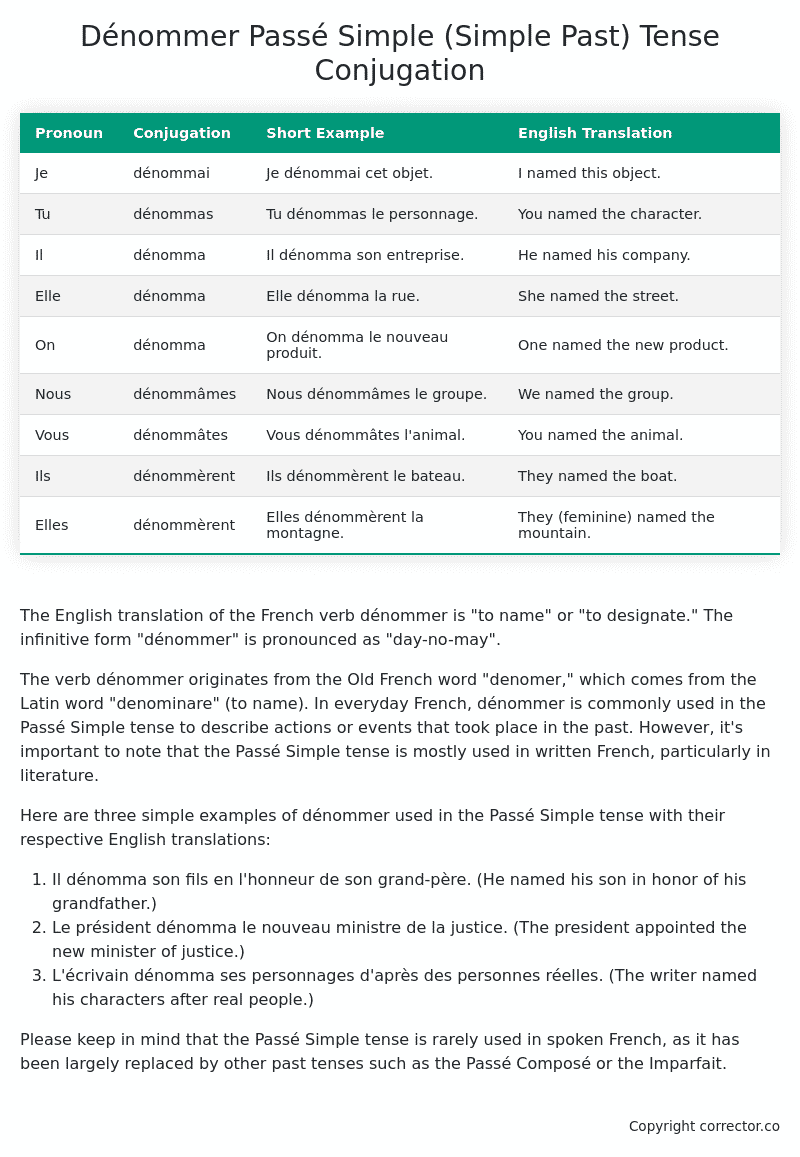Passé Simple (Simple Past) Tense Conjugation of the French Verb dénommer
Introduction to the verb dénommer
The English translation of the French verb dénommer is “to name” or “to designate.” The infinitive form “dénommer” is pronounced as “day-no-may”.
The verb dénommer originates from the Old French word “denomer,” which comes from the Latin word “denominare” (to name). In everyday French, dénommer is commonly used in the Passé Simple tense to describe actions or events that took place in the past. However, it’s important to note that the Passé Simple tense is mostly used in written French, particularly in literature.
Here are three simple examples of dénommer used in the Passé Simple tense with their respective English translations:
- Il dénomma son fils en l’honneur de son grand-père.
(He named his son in honor of his grandfather.) - Le président dénomma le nouveau ministre de la justice.
(The president appointed the new minister of justice.) - L’écrivain dénomma ses personnages d’après des personnes réelles.
(The writer named his characters after real people.)
Please keep in mind that the Passé Simple tense is rarely used in spoken French, as it has been largely replaced by other past tenses such as the Passé Composé or the Imparfait.
Table of the Passé Simple (Simple Past) Tense Conjugation of dénommer
| Pronoun | Conjugation | Short Example | English Translation |
|---|---|---|---|
| Je | dénommai | Je dénommai cet objet. | I named this object. |
| Tu | dénommas | Tu dénommas le personnage. | You named the character. |
| Il | dénomma | Il dénomma son entreprise. | He named his company. |
| Elle | dénomma | Elle dénomma la rue. | She named the street. |
| On | dénomma | On dénomma le nouveau produit. | One named the new product. |
| Nous | dénommâmes | Nous dénommâmes le groupe. | We named the group. |
| Vous | dénommâtes | Vous dénommâtes l’animal. | You named the animal. |
| Ils | dénommèrent | Ils dénommèrent le bateau. | They named the boat. |
| Elles | dénommèrent | Elles dénommèrent la montagne. | They (feminine) named the mountain. |
Other Conjugations for Dénommer.
Le Present (Present Tense) Conjugation of the French Verb dénommer
Imparfait (Imperfect) Tense Conjugation of the French Verb dénommer
Passé Simple (Simple Past) Tense Conjugation of the French Verb dénommer (You’re reading it right now!)
Passé Composé (Present Perfect) Tense Conjugation of the French Verb dénommer
Futur Simple (Simple Future) Tense Conjugation of the French Verb dénommer
Futur Proche (Near Future) Tense Conjugation of the French Verb dénommer
Plus-que-parfait (Pluperfect) Tense Conjugation of the French Verb dénommer
Passé Antérieur (Past Anterior) Tense Conjugation of the French Verb dénommer
Futur Antérieur (Future Anterior) Tense Conjugation of the French Verb dénommer
Subjonctif Présent (Subjunctive Present) Tense Conjugation of the French Verb dénommer
Subjonctif Passé (Subjunctive Past) Tense Conjugation of the French Verb dénommer
Subjonctif Imparfait (Subjunctive Imperfect) Tense Conjugation of the French Verb dénommer
Subjonctif Plus-que-parfait (Subjunctive Pluperfect) Tense Conjugation of the French Verb dénommer
Conditionnel Présent (Conditional Present) Tense Conjugation of the French Verb dénommer
Conditionnel Passé (Conditional Past) Tense Conjugation of the French Verb dénommer
Conditionnel Passé II (Conditional Past II) Tense Conjugation of the French Verb dénommer
L’impératif Présent (Imperative Present) Tense Conjugation of the French Verb dénommer
L’impératif Passé (Imperative Past) Tense Conjugation of the French Verb dénommer
L’infinitif Présent (Infinitive Present) Tense Conjugation of the French Verb dénommer
L’infinitif Passé (Infinitive Past) Tense Conjugation of the French Verb dénommer
Le Participe Présent (Present Participle) Tense Conjugation of the French Verb dénommer
Le Participe Passé (Past Participle) Tense Conjugation of the French Verb dénommer
Struggling with French verbs or the language in general? Why not use our free French Grammar Checker – no registration required!
Get a FREE Download Study Sheet of this Conjugation 🔥
Simply right click the image below, click “save image” and get your free reference for the dénommer Passé Simple tense conjugation!

Dénommer – About the French Passé Simple (Simple Past) Tense
Formation
Usage
Narration
Historical Context
Interactions with other tenses
Passé Composé
Imparfait
Conditional and Subjunctive
Summary
I hope you enjoyed this article on the verb dénommer. Still in a learning mood? Check out another TOTALLY random French verb conjugation!


